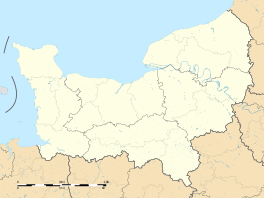Bény-sur-Mer
| Bény-sur-Mer | |
|---|---|

Chateau of Tournebu
|
|
| Coordinates: 49°17′24″N 0°26′03″W / 49.29°N 0.4342°WCoordinates: 49°17′24″N 0°26′03″W / 49.29°N 0.4342°W | |
| Country | France |
| Region | Normandy |
| Department | Calvados |
| Arrondissement | Caen |
| Canton | Bretteville-l'Orgueilleuse |
| Intercommunality | Orival |
| Government | |
| • Mayor (2008–2014) | Hubert Delalande |
| Area1 | 6.65 km2 (2.57 sq mi) |
| Population (2008)2 | 333 |
| • Density | 50/km2 (130/sq mi) |
| Time zone | CET (UTC+1) |
| • Summer (DST) | CEST (UTC+2) |
| INSEE/Postal code | 14062 /14440 |
| Elevation | 10–65 m (33–213 ft) (avg. 43 m or 141 ft) |
|
1 French Land Register data, which excludes lakes, ponds, glaciers > 1 km² (0.386 sq mi or 247 acres) and river estuaries. 2Population without double counting: residents of multiple communes (e.g., students and military personnel) only counted once. |
|
1 French Land Register data, which excludes lakes, ponds, glaciers > 1 km² (0.386 sq mi or 247 acres) and river estuaries.
Bény-sur-Mer is a commune in the Calvados department in the Normandy region in northwestern France.
Bény-sur-Mer was liberated on D-Day by Le Régiment de la Chaudière, a French Canadian unit. There was a gun battery located near the town at the time. The locals were surprised to have been liberated by fellow francophones, expecting only English-speaking troops.
The Bény-sur-Mer Canadian War Cemetery, named after Bény-sur-Mer even though it is closer to Reviers, commemorates Canadian losses suffered on D-Day 1944 and subsequent battles early in World War II. The cemetery has 2,049 headstones.
...
Wikipedia


